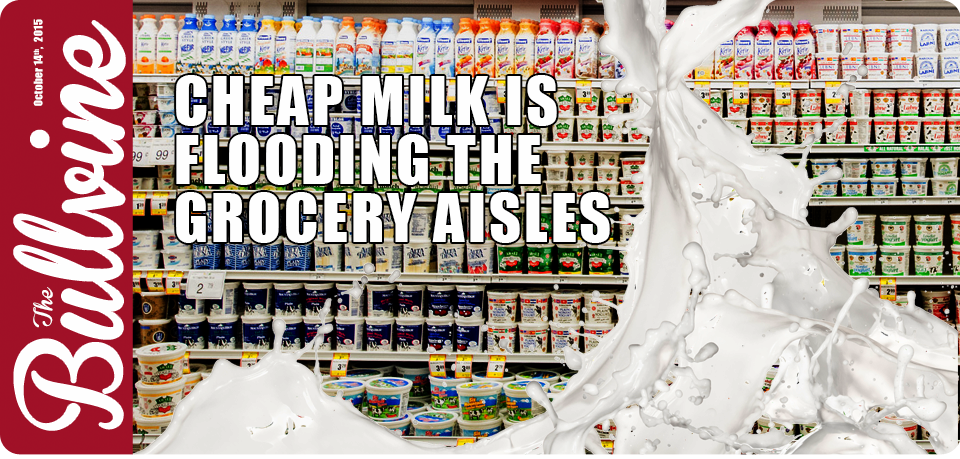Who wins when a price war erupts between competing products? In the case of water and milk in Europe and the UK, the 5% lower store prices for milk may be great for consumers but the 20% loss at the farm gate is terrible for farmers.
Too Much of a Good Thing
Currently, there is so much milk available in Europe that it is selling cheaper than water. Several conditions have caused this milk surplus led by anything that contributes to rising supply and falling demand.
Too Much Milk Production.
Removal of milk production quotas on EU farms marked the opening of the milk floodgates. For the first time in 30 years, farmers were able to produce as much as they wanted. However, it contributed to oversupply. Quotas were originally instituted to prevent overproduction of milk and butter that had happened in the eighties. Quotas set limits on production and established penalties for overproduction. When they were lifted, it was hoped that it would allow European dairy farmers to compete for business in emerging markets, such as in Asia
Not Enough Demand.
Falling milk demand from China, the Middle East and North Africa was not anticipated and adds even further to the over-supply.
Not Enough Exports.
Forget “From Russia with Love”. In 2014, the Russian food embargo cut butter 24% and cheese import 32% into that country. This continues to have a tremendous impact.
Too Much Price Competition in Supermarkets.
All of the above are further aggravated in the UK by supermarket price wars.
The Worst that Can Happen? Now Milk is Cheaper than Water!
In England, a bottle of water costs roughly $1.50. In France, mineral water costs $1. That’s not new you say. What is new is that, with the 20% fall in wholesale milk prices, a liter or milk might be selling for just $1.
Milk Slump Escalates Protests from Push to Shove
With the oversupply of milk depressing the sale price to milk producers, farmers are increasingly agitated with the losses they are shouldering. Milk is selling for less than what it costs to produce it In the UK protests have taken place ranging from clearing grocery shelves to throwing fruit and, in one instance, parading cows through a supermarket. In Brussels farmers, there took matters into their frustrated hands by throwing eggs, hay and fireworks at riot police.
Calls for Relief
Along with the emotional reaction, there have been more reasoned appeals for relief. The British National Union is calling for supermarkets to increase prices to match production costs. With hopes of getting prices returned to an economically viable level, the European Milk Board is calling for the return of production quotas. President of the Milk Board, Romuald Schnaber, sums it up succinctly, “Unless production is reduced, the market will continue deteriorating at a pace.
Where are Governments in These Bad News and The Good News Scenarios?
Proactive support for the dairy industry has been called for and pledges proposed and started. The EU is offering $555 million, and France put 600 million euros in place in July. If there is a silver lining in this dark scenario, it’s that new and old milk lovers are enjoying the cheap milk prices. Hopefully, increased consumption will continue and help to grow the market and produce more stable future prices at the dairy farm gate.
Who is telling the Whole Milk Truth?
Back in January 2015 Rob Lyons (Spiked) argued that “Milk is not cheaper than water.” The premise he supports this counter headline position with is that “From booze to petrol, water is the scaremongers’ comparison of choice.” Lyons appears to question that no milk could be cheaper than the water that is free when falling from the skies or coming out of taps. He asks, somewhat naively, after pointing out that milk is indeed cheaper on shelves than the nearby bottled water on the same shelves “And is this having a knock-on effect on the price received by producers?” You think?
Desperate Dairies
Some dairy spokespersons claim that the slashed prices have left UK dairy farmers facing poverty and financial ruin. None can continue selling for 10 pence less per litre of milk than it costs to produce it. If you work it out on the basis of an average of 2,500 litres produced daily, it is easy to see how desperate the situation has become. According to the National Farmers Union, approximately 200 dairy producers have left the industry since January.
What is the Answer?
In truth, there are no easy answers that can satisfy everyone affected by the cheap prices being paid for milk. Who has the most to win? The producer? The distributor? The consumer? As long as they all compete with each other and fail to find a workable compromise, there is a very real danger that the question of winning will become irrelevant.
The Bullvine Bottom Line
It’s not about short-term wins. From farm gate to grocery aisle, for any of the stakeholders to benefit, there has to be a viable and sustainable dairy industry.

Get original “Bullvine” content sent straight to your email inbox for free.















Leave a Reply
You must be logged in to post a comment.